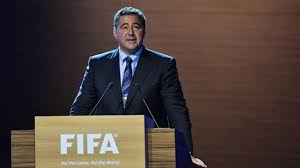By Andrew Warshaw
September 10 – FIFA is at a “watershed” moment when it comes to the credibility of the organisation according to Domenico Scala, the official overseeing the reform process whose comprehensive eight-point plan for widespread change in the post-Sepp Blatter era was made public today.
“If FIFA does not move, public opinion will not change,” said Scala, head of FIFA’s independent audit and compliance committee, during a conference call following the release of his detailed blueprint for change.
“I made it very clear when Mr Blatter laid down his mandate that it was not only about the change of presidency but that there were certain systemic issues that need to be addressed. We need reforms now, we can’t wait. FIFA works very well operationally and has not come to a halt. But this is a watershed in terms of role and perception going forward.”
Scala identified term limits, which he said was at the heart of FIFA’s problems, as the most important of his eight stringent recommendations.
“A number of issues have their root cause in the fact that people have stayed for far too long in a number of key positions.”
But he failed to convincingly explain why, when he had compiled such a comprehensive report, FIFA had needed to set up its much-touted Reform Task Force, headed by former Olympics guru Francois Carrard and which met for the first time last week, to devise a second set of proposals in parallel to his own.
Describing as “complete rubbish” the suggestion that he was not made chairman of the Reform Task Force because he was too close to FIFA, Scala told reporters he was entirely within his rights to publish his own views and that it was not an exercise in self-promotion.
“It is absolutely my function to make views known and my report stands on its own,” he said. “I decided personally to substantiate in detail what I presented to the exco on July 20. It’s my choice. The Reform committee is free to contact me any time they want.”
“I have given them my input and they are now free to make an assessment. We need to have a working group doing this intensively. I have been utterly transparent in terms of taking up my responsibility and now I’ll step back. I can’t second guess the Reform Committee but ultimately it’s the exco who are accountable for implementation.”
Scala admitted that not all of his ideas may get the green light at the same time. “Even if we agree in principle on my eight points, this may not happen in one go. Maybe these will get implemented in two steps.”
Turning to the presidential election last May and the next one on February, Scala suggested candidates were high on rhetoric but low on detail. “We seem to have a lot of nice words like transparency and democracy but we need to articulate what it actually means and I have tried to do that in my document.”
Whilst declining to point the finger at Blatter specifically for dragging his feet, Scala added: “The proposals outlined could have been addressed many years ago. I hope people now understand the seriousness of the situation. I have had no bilateral conversations with Mr Blatter but he has seen the presentation at the (July) exco. “
Asked why substantive reforms might finally be given the go-ahead after a series of half-measures in the past, Scala replied: “The situation is quite different because of the (ongoing US and Swiss) investigations. The organisation has never been so seriously questioned.”
Contact the writer of this story at moc.l1745039268labto1745039268ofdlr1745039268owedi1745039268sni@w1745039268ahsra1745039268w.wer1745039268dna1745039268

